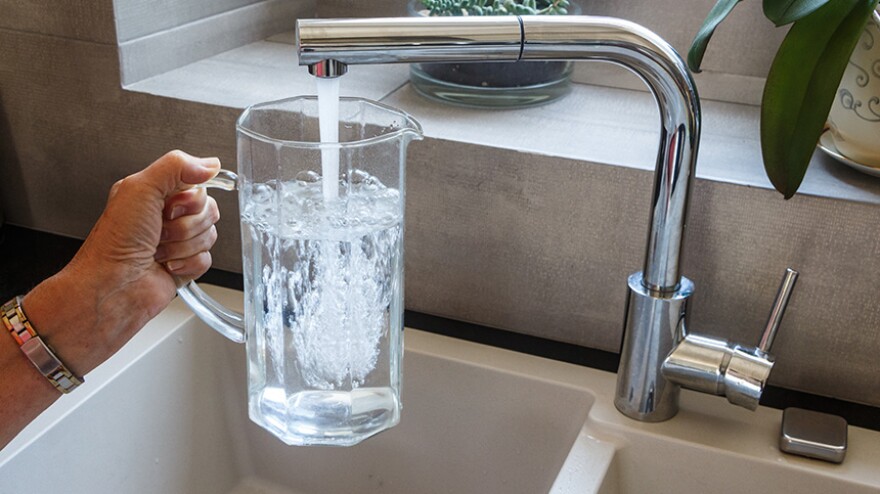BETHLEHEM, Pa. — Twenty-four members of the state House of Representatives, including five of 11 from the Lehigh Valley, have signed on to a bill that would notify utility customer if their water usage increases 50% in a single month.
The bill comes amid complaints in Bethlehem of unusually high water bills.
The proposed red flag, high-water usage document, known as House Bill 905, if approved as written would require “a municipal authority [to] provide notice to utility customers if the municipal authority determines that the water usage has increased by 50% for one month above the average water usage for the property.”
The same would go for public utility entities.
With the bill now in committee, the House Majority Policy Committee — including Reps. Ryan Bizzarro, Jeanne McNeill, Michael Schlossberg and Peter Schweyer — heard commentary Tuesday from water authority officials and a local customer.
Watch the full hearing here.
'Under intense pressure'
Lehigh County Authority Chief Executive Officer Liesel Gross said public nonprofit LCA provides water and wastewater services to about 270,000 people in Allentown and its surrounding communities.
Gross said she also was testifying on behalf of the Pennsylvania Municipal Authorities Association, which represents more than 700 authorities statewide and serves six million customers.
And she said with some systems in place in need of replacement, some rate increases are simply unavoidable — even in light of inflation.
“In today’s environment, water utilities are under intense pressure,” Gross said.
“There are lots of new regulations and new requirements that we’re trying to meet at the same time as addressing aging infrastructure, and the costs that are associated with repairing 100-year-old pipes and pumps throughout the systems.”
“In today’s environment, water utilities are under intense pressure. There are lots of new regulations and new requirements that we’re trying to meet at the same time as addressing aging infrastructure, and the costs that are associated with repairing 100-year-old pipes and pumps throughout the systems.”Lehigh County Authority CEO Liesel Gross
Gross said her time with LCA has seen “quite a few” cases involving high bills, and on a “fairly routine” basis.
“I would say 99 times out of 100, the customer knows why they’re getting a high bill,” she said.
“We do unfortunately, occasionally have situations like the [Will-Webers’] experience where a high bill comes in, you really don’t know why it happened.
“The water went through the meter, it went somewhere — but it’s unexplained in some way.”
She cited leaking toilets as a likely culprit in those cases.
Water official's thoughts on the bill
Gross said the groups for whom she spoke were supportive of House Bill 905 in general but wanted to see more specifics included in its language, specifically regarding the term “customer” and flexibility for entities billing monthly and quarterly.
The bill, in its current state, specifically references monthly billing — and not all entities charge at that frequency.
The current verbiage would even mean a “pretty significant” change in the entity’s current responsibilities.
She said utility entities really only focus on “system to the curb line,” and don’t often have certified plumbers on staff to check for problems within the home.
Continued employee training in the realm of billing analysis paired with further customer education and outreach could go a long way, Gross said.
New bill would be 'a start'
The customer was Mark Will-Weber, who alongside his wife, Sally, has been consistently sharing their story at Bethlehem City Council meetings since last fall.
The couple said they are expecting a grandson and wants to fly out to see their daughter living on the West Coast.
But Will-Weber said he can’t help but think back to his previous experience with Bethlehem Water and Sewer Resources, its Director Edward Boscola and a mysteriously high bill last March.
“If I fly out to see my grandson, is Ed Boscola gonna have his hand in my pocket for 500 bucks when I get back?” Will-Weber said.
“And you might say, ‘Wow, this guy’s pretty paranoid at this point.’
And nobody can say whether or not I’ll get hit up for a charge like that again — under dubious, I think, dubious circumstances.”
“I’m trying to emphasize the deck is stacked against the citizen consumer. … It’s not a panacea. The issue is very complex. There’s no complete answer, but it’s a start.”Bethlehem resident Mark Will-Weber
People by and large can’t afford the fee hikes anyway, he said, referencing a recent 8% sewer fee increase for Bethlehem wastewater customers.
But McNeill’s legislation would be a step in the right direction, he said.
“I’m trying to emphasize the deck is stacked against the citizen consumer,” Will-Weber said.
“It’s not a panacea. The issue is very complex. There’s no complete answer, but it’s a start.”
McNeill's mission
The “red flag” water usage bill was introduced by state Rep. Jeanne McNeill, D-Lehigh, after she said a constituent came to her with a similar situation to that of the Will-Webers.
She said the resident reportedly had gone on vacation for some time and came back to an “enormous” water charge.
The person was told by Bethlehem Water Department there was no issue with the meter, and a hired plumber found no issues within the home, she said.
“Residents are often unaware of an issue until a bill — sometimes only mailed quarterly — arrives with hundreds or even thousands more owed than expected. When a water bill increases, so does the sewer bill, which creates an even larger financial issue.”Rep. Jeanne McNeill, D-Lehigh
She said she’s made contact with four other families with similar issues since the original case.
“Residents are often unaware of an issue until a bill — sometimes only mailed quarterly — arrives with hundreds or even thousands more owed than expected,” McNeill said.
“When a water bill increases, so does the sewer bill, which creates an even larger financial issue.”
McNeill represents House District 133, which includes parts of Bethlehem, Hanover Township, Whitehall Township, Catasauqua, Coplay and Fountain Hill.


